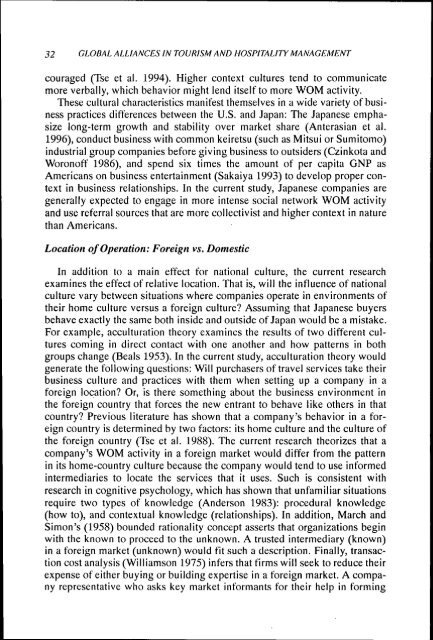global alliances in tourism and hospitality management 0789008181
global alliances in tourism and hospitality management 0789008181
global alliances in tourism and hospitality management 0789008181
Create successful ePaper yourself
Turn your PDF publications into a flip-book with our unique Google optimized e-Paper software.
32 GLOBAL ALLIANCES IN TOURISM AND HOSPITALITY MANAGEMENT<br />
couraged (Tse et al. 1994). Higher context cultures tend to communicate<br />
more verbally, which behavior might lend itself to more WOM activity.<br />
These cultural characteristics manifest themselves <strong>in</strong> a wide variety of bus<strong>in</strong>ess<br />
practices differences between the U.S. <strong>and</strong> Japan: The Japanese emphasize<br />
long-term growth <strong>and</strong> stability over market share (Anterasian et al.<br />
1996), conduct bus<strong>in</strong>ess with common keiretsu (such as Mitsui or Sumitomo)<br />
<strong>in</strong>dustrial group companies before giv<strong>in</strong>g bus<strong>in</strong>ess to outsiders (Cz<strong>in</strong>kota <strong>and</strong><br />
Woronoff 1986), <strong>and</strong> spend six times the amount of per capita GNP as<br />
Americans on bus<strong>in</strong>ess enterta<strong>in</strong>ment (Sakaiya 1993) to develop proper context<br />
<strong>in</strong> bus<strong>in</strong>ess relationships. In the current study, Japanese companies are<br />
generally expected to engage <strong>in</strong> more <strong>in</strong>tense social network WOM activity<br />
<strong>and</strong> use referral sources that are more collectivist <strong>and</strong> higher context <strong>in</strong> nature<br />
than Americans.<br />
Location of Operation: Foreign vs. Domestic<br />
In addition to a ma<strong>in</strong> effect for national culture, the current research<br />
exam<strong>in</strong>es the effect of relative location. That is, will the <strong>in</strong>fluence of national<br />
culture vary between situations where companies operate <strong>in</strong> environments of<br />
their home culture versus a foreign culture? Assum<strong>in</strong>g that Japanese buyers<br />
behave exactly the same both <strong>in</strong>side <strong>and</strong> outside of Japan would be a mistake.<br />
For example, acculturation theory exam<strong>in</strong>es the results of two different cultures<br />
com<strong>in</strong>g <strong>in</strong> direct contact with one another <strong>and</strong> how patterns <strong>in</strong> both<br />
groups change (Beals 1953). In the current study, acculturation theory would<br />
generate the follow<strong>in</strong>g questions: Will purchasers of travel services take their<br />
bus<strong>in</strong>ess culture <strong>and</strong> practices with them when sett<strong>in</strong>g up a company <strong>in</strong> a<br />
foreign location? Or, is there someth<strong>in</strong>g about the bus<strong>in</strong>ess environment <strong>in</strong><br />
the foreign country that forces the new entrant to behave like others <strong>in</strong> that<br />
country? Previous literature has shown that a company's behavior <strong>in</strong> a foreign<br />
country is determ<strong>in</strong>ed by two factors: its home culture <strong>and</strong> the culture of<br />
the foreign country (Tse et al. 1988). The current research theorizes that a<br />
company's WOM activity <strong>in</strong> a foreign market would differ from the pattern<br />
<strong>in</strong> its home-country culture because the company would tend to use <strong>in</strong>formed<br />
<strong>in</strong>termediaries to locate the services that it uses. Such is consistent with<br />
research <strong>in</strong> cognitive psychology, which has shown that unfamiliar situations<br />
require two types of knowledge (Anderson 1983): procedural knowledge<br />
(how to), <strong>and</strong> contextual knowledge (relationships). In addition, March <strong>and</strong><br />
Simon's (1958) bounded rationality concept asserts that organizations beg<strong>in</strong><br />
with the known to proceed to the unknown. A trusted <strong>in</strong>termediary (known)<br />
<strong>in</strong> a foreign market (unknown) would fit such a description. F<strong>in</strong>ally, transaction<br />
cost analysis (Williamson 1975) <strong>in</strong>fers that firms will seek to reduce their<br />
expense of either buy<strong>in</strong>g or build<strong>in</strong>g expertise <strong>in</strong> a foreign market. A company<br />
representative who asks key market <strong>in</strong>formants for their help <strong>in</strong> form<strong>in</strong>g





